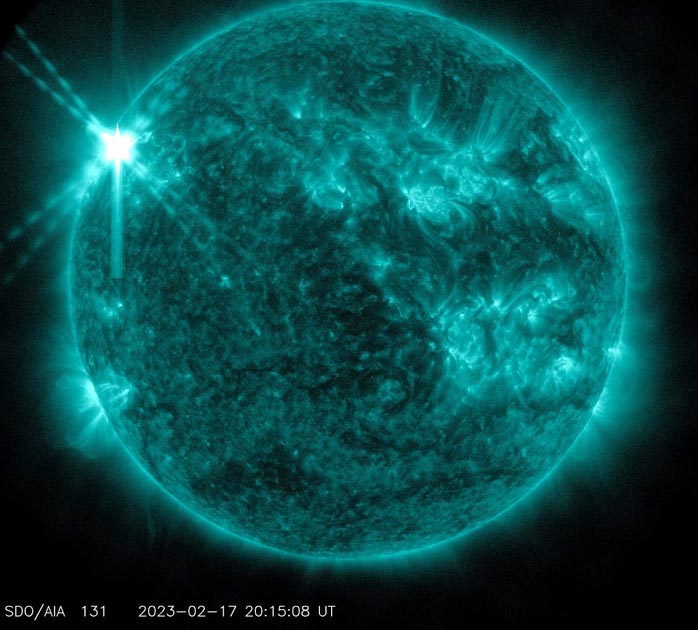Sun Releases Strong Solar Flare

NASA’s Solar Dynamics Observatory captured this image of a solar flare – as seen in the bright flash in the upper left – on Feb. 17, 2023. The image shows a subset of extreme ultraviolet light that highlights the extremely hot material in flares and which is colorized in teal.
Credit: NASA/SDO
The Sun emitted a strong solar flare, peaking at 3:16 p.m. ET on Feb. 17, 2023. NASA’s Solar Dynamics Observatory, which watches the Sun constantly, captured an image of the event.
Solar flares are powerful bursts of energy. Flares and solar eruptions can impact radio communications, electric power grids, navigation signals, and pose risks to spacecraft and astronauts.
This flare is classified as an X2.2 flare. X-class denotes the most intense flares, while the number provides more information about its strength.
To see how such space weather may affect Earth, please visit NOAA’s Space Weather Prediction Center https://spaceweather.gov/, the U.S. government’s official source for space weather forecasts, watches, warnings, and alerts. NASA works as a research arm of the nation’s space weather effort.
NASA observes the Sun and our space environment constantly with a fleet of spacecraft that study everything from the Sun’s activity to the solar atmosphere, and to the particles and magnetic fields in the space surrounding Earth.
Media Contact
Abbey Interrante
NASA/Goddard Space Flight Center
abbey.a.interrante@nasa.gov
All latest news from the category: Physics and Astronomy
This area deals with the fundamental laws and building blocks of nature and how they interact, the properties and the behavior of matter, and research into space and time and their structures.
innovations-report provides in-depth reports and articles on subjects such as astrophysics, laser technologies, nuclear, quantum, particle and solid-state physics, nanotechnologies, planetary research and findings (Mars, Venus) and developments related to the Hubble Telescope.
Newest articles

Hyperspectral imaging lidar system achieves remote plastic identification
New technology could remotely identify various types of plastics, offering a valuable tool for future monitoring and analysis of oceanic plastic pollution. Researchers have developed a new hyperspectral Raman imaging…

SwRI awarded $26 million to develop NOAA magnetometers
SW-MAG data will help NOAA predict, mitigate the effects of space weather. NASA and the National Oceanic and Atmospheric Administration (NOAA) recently awarded Southwest Research Institute a $26 million contract…

Protein that helps cancer cells dodge CAR T cell therapy
Discovery could lead to new treatments for blood cancer patients currently facing limited options. Scientists at City of Hope®, one of the largest and most advanced cancer research and treatment…



